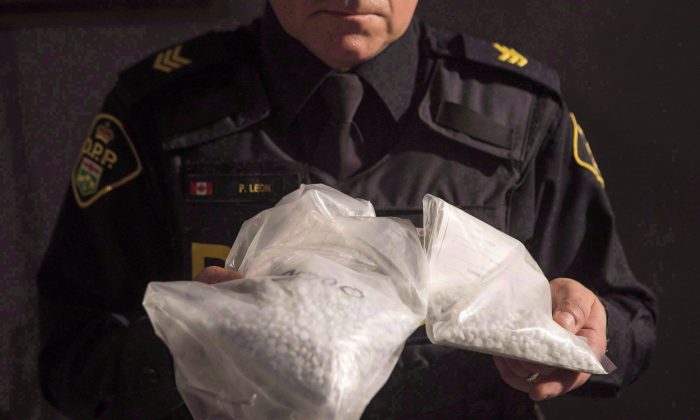US Should Recognize American Samoans as Citizens, Judge Says
A $1.55 million competition for fast and nonintrusive illicit opioid detection technology has culminated with the announcement of its winners on Dec. 12.
The grand prize and runner-up in the Opioid Detection Challenge were announced by the U.S. Department of Homeland Security (DHS) Science and Technology Directorate (S&T), the White House Office of National Drug Control Policy (ONDCP), U.S. Customs and Border Protection (CBP), and the U.S. Postal Inspection Service (USPIS).
The Institute for Data, Systems, and Society (IDSS) won the grand prize, worth $500,000. Their detection solution is based on the combination of a 3D X-ray CT scanner and detection algorithms. Their award-winning technological tool identifies anomalies in the scanned images’ features and physical properties.
Second place went to One Resonance, who was awarded $250,000 for its innovative detection tool, the QROD, “a quadrupole resonance technology that uses radio-frequency signals to search for specific materials.”
 The U.S. Department of Homeland Security (DHS) seal hangs on a fence at the agency’s headquarters in Washington on Dec. 11, 2014. (Andrew Harrer/Bloomberg via Getty Images)
The U.S. Department of Homeland Security (DHS) seal hangs on a fence at the agency’s headquarters in Washington on Dec. 11, 2014. (Andrew Harrer/Bloomberg via Getty Images)The challenge was established to tackle the drug trafficking that occurs on a large scale via small packages in the postal mail, with the opioids typically being transported in a powdered, nearly pure form.
“The influx of illicit drugs is one of the nation’s greatest threats,” William N. Bryan, DHS Senior Official Performing the Duties of Under Secretary for Science and Technology said. “Through this combined effort to address the trafficking of opioids, S&T, our federal partners, and the private sector have produced technology solutions that will better protect the American people from the effects of this devastating crisis.”
“The Trump Administration is committed to reversing the effects of the drug crisis through both traditional practices and creative, unique methods,” said ONDCP Director Carroll. “This challenge brought our whole-of-government approach together with the private sector to find ways to stop the flow of deadly substances into our country, which raises a grave national security concern. I congratulate the winners and thank them for sharing our commitment to accomplishing our ultimate goal of saving American lives.”
“In the fiscal year 2019, our agents and officers seized nearly 2,600 pounds of fentanyl compared with 1,895 pounds in the fiscal year 2018,” said CBP Deputy Commissioner Perez. “This is an alarming 35 percent increase over the course of one year, and international mail has been one of the places that we are seeing illicit opioids come into the United States. Emerging technologies that can help us stop the flow of opioids across our borders are critical to the fight against the opioid epidemic.”
According to the National Institute on Drug Abuse, more than 130 people die in the United States due to misuse of pain relievers, heroin, and fentanyl among other opioids. The Centers for Disease Control says that the estimated economic burden of this crisis is $78.5 billion a year.
“Opioids, such as fentanyl, have become a public health crisis, impacting our nation, states, towns, communities, homes, and families,” said USPIS Chief Postal Inspector Barksdale. Through this challenge, the Postal Service and other agencies are joining forces so that together, we can develop new technologies that will help combat the opioid epidemic and thwart the distribution of illegal drugs or other harmful substances through the mail. The Postal Inspection Service is dedicated to ridding the mail of illicit drug trafficking, preserving the integrity of the mail, and, most importantly, providing a safe environment for postal employees and the American public.”
The Opioid Detection Challenge homepage states that in 2017, approximately 50,000 Americans died due to opioid overdose.
For more information, visit https://www.dhs.gov/science-and-technology/Challenge-Updates.
This article is from the Internet:Prize Winners Announced in $1.55 Million Challenge for Opioid Detection in Mails
Congressman Suggests National Guard Could Enforce Gun Laws in Virginia
